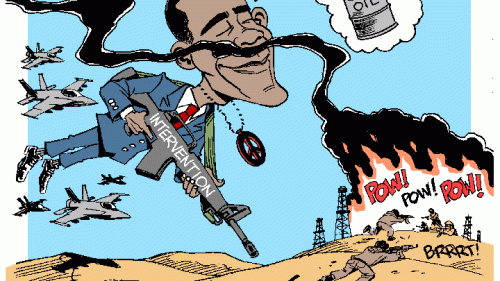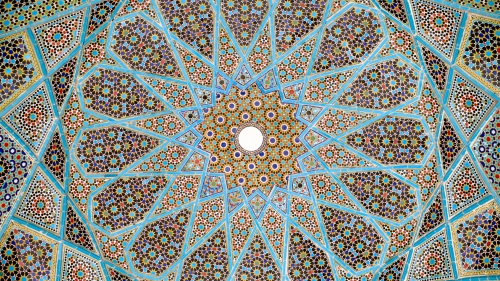Running Out of Oil - and Time
 |
The news last month that the vast Saudi oil fields are in decline is a far bigger story than most in the media, or the United States, seem to realize. We may begrudge the Saudis their 30-year stranglehold on the world economy. But even the possibility that the lords of oil have less of the stuff than advertised raises troubling questions. How long will the world's long-term oil supplies last? As important, what will the big importing nations, like the U.S., do the day world oil production hits its inevitable peak?
For more than a century, Western governments have been relentlessly upbeat about the long-term outlook for oil. Whenever pessimists claimed that supplies were running low - as they have many times - oil companies always seemed to discover huge new fields. It's now an article of faith among oil optimists, including those in the U.S. government, that global oil reserves won't run out for at least four decades, which seems like enough time to devise a whole suite of alternative energy technologies to smoothly and seamlessly replace oil.
But such oil optimism, always questionable, is now more suspect than ever. True, we won't "run out" of oil tomorrow, or even 10 years from now. But the long-term picture is grim. In the first place, it's not a matter of running out of oil but of hitting a production peak. Since 1900, world oil production - that is, the number of barrels we can pump from the ground - has risen in near-perfect step with world oil demand. Today, demand stands at about 29 billion barrels of oil a year, and so does production. By 2020, demand may well be 45 billion barrels a year, by which time, we hope, oil companies will have upped production accordingly.
At some point, however, production simply won't be able to match demand. Oil is an exhaustible resource: The more you produce, the less remains in the ground, and the harder it is to bring up that remainder. We won't be "out of oil"; a vast amount will still be flowing - just not quickly enough to satisfy demand. And as any economist can tell you, when supply falls behind demand, bad things happen.
During the 1979 Iranian revolution, the last time oil production fell off significantly, world oil prices hit the modern equivalent of $80 a barrel. And that, keep in mind, was a temporary decline. If world oil production were to truly peak and begin a permanent decline, the effect would be staggering: Prices would not come back down. Any part of the global economy dependent on cheap energy - which is to say, pretty much everything these days - would be changed forever.
And that's the good news. The term "peak" tends to suggest a nice, neat curve, with production rising slowly to a halfway point, then tapering off gradually to zero - as if, since it took a century to reach a peak, it ought to take another 100 years to reach the end. But in the real world, the landing will not be soft. As we hit the peak, soaring prices - $70, $80, even $100 a barrel - will encourage oil companies and oil states to scour the planet for oil. For a time, they will succeed, finding enough crude to keep production flat, thus stretching out the peak into a kind of plateau and perhaps temporarily easing fears. But in reality, this manic, post-peak production will deplete remaining reserves all the more quickly, thus ensuring that the eventual decline is far steeper and far more sudden. As one U.S. government geologist put it to me recently, "the edge of a plateau looks a lot like a cliff."
As production falls off this cliff, prices won't simply increase; they will fly. If our oil dependence hasn't lessened drastically by then, the global economy is likely to slip into a recession so severe that the Great Depression will look like a dress rehearsal. Oil will cease to be viable as a fuel - hardly an encouraging scenario in a world where oil currently provides 40% of all energy and nearly 90% of all transportation fuel. Political reaction would be desperate. Industrial economies, hungry for energy, would begin making it from any source available - most likely coal - regardless of the ecological consequences. Worse, competition for remaining oil supplies would intensify, potentially leading to a new kind of political conflict: the energy war.
Thus, when we peak becomes a rather pressing question. Some pessimists tell us the peak has already come, and that calamity is imminent. That's unlikely. But the optimists' forecast - that we don't peak until around 2035 - is almost as hard to believe. First, oil demand is climbing faster than optimists had hoped, mainly because China and India, the sleeping giants, are waking up to embrace a Western-style high-energy industrialism that includes tens of millions of new cars. Second, even as oil demand is rising, oil discovery rates are falling. Oil can't be produced without first being found, and the rate at which oil companies are locating new oil fields is in serious decline. The peak for world discoveries was around 1960; today, despite astonishing advances in exploration and production technology, the industry is finding just 12 billion new barrels of oil each year - less than half of what we use. This is one reason that oil prices, which had averaged $20 a barrel since the 1970s, have been hovering at $30 for nearly a year.
Oil companies, not surprisingly, are getting anxious. Despite the fact that the current high oil prices are yielding massive company profits, companies are finding it harder and harder to replace the oil they sell with newly discovered barrels. On average, for every 10 barrels an oil company sells, its exploration teams find just four new barrels - a trend that can go on only so long. Indeed, most Western oil firms now say the only way to halt this slide is to get back into the Middle East, which kicked them out during the OPEC nationalizations of the 1960s and '70s. This has, in fact, become the mantra of the oil industry: Get us back into the Middle East or be prepared for trouble. And the Bush administration seems to have taken the message to heart.
Now, of course, the Middle East is looking less and less like the Promised Land. Western analysts have long feared that the Saudis and other oil-state leaders are too corrupt, unstable and bankrupt to step up their oil production fast enough to meet surging world demand. Last week's revelations, in which some Saudis themselves expressed doubt over future production increases, have only heightened such concerns.
Put another way, we may not be able to pinpoint exactly when a peak is coming, but recent events suggest that it will be sooner than the optimists have been telling us - perhaps by 2020, or even 2015 if Asian demand picks up as fast as some analysts now expect. What this means is that we can no longer sit back and hope that an alternative to oil will come along in time. Such complacency all but ensures that, when the peak does arrive, our response will be defensive, costly and hugely disruptive. Instead, we must begin now, with every tool at our disposal, to find ways to get "beyond petroleum" if we are to have any hope of controlling the shift from oil to whatever comes next.
Paul Roberts writes about the energy industry for Harper's Magazine and other national publications. His new book, "The End of Oil: On the Edge of a Perilous New World," will be published in May 2004.
Source: Los Angeles Times
Related Suggestions
As Asgher has suggested, you may want to learn about the facts for a change. But I have little hope for your kind ever understanding such concepts.
What makes you think that msulims pray for oil! It sure shows how little you know about Muslims. Get a life man and read a little about islam.
This is for free: We pray for the Only One God, The Creator of this Universe, The One and The Only Eternal Lord. Some of us even go as far to say that adding a PERSONAL wish list AFTER each prayer can be a sin! let alone praying for oil!! WHat utter rubbish and nonesense besides most of the common people in oil producing countries of the Middle East don't get to see much of the cash for oil anyway. So, it would be like praying for god to give another Rolls Royce to your already rich neighbour! How preposterous.
The idea that one worships material stuff is totally alien to Islam. Please read before you dribble. Truly we waste our time with such ignorance. Go visit another site please since you are unable to contribute to a healthy and balanced forum.
As for me I know I can and will survive living the life of using palm oil bushlamp in a small hut in either a desert or any forest wherever in the world. What of you? Are you ready for that?
Oh Allah continue to guide us unto the path that is straight to YOU.
Still, the sooner we run out the better, if only America and its incs would leave us alone to get on with life, even if we get back to the basics. It may teach us that wealth must be nurtured and shared, a lesson we have not learnt yet despite 100 years of God's great bounty.
As for Ramish: a smart person buys insurance to safeguard against adversity. It does not hurt one bit - and no cash is demanded - to believe the existance of One God and Life after death. When you die, as we all do, and discover that there is no life after death- will you would have lost nothing at all! BUT if you find that there is life after death, then bingo!! you are a winner too. Smart people buy insurance, so let this be your insurance and no sales person will knock on your door for cash, like I said.
But hey, you have the choice and if you choose to make fun of my remarks, I'd love to be the fly on the wall when death comes knocking on your door, not because I am sadistic but it makes a good case study. Peace be upon you.
As usual, people don't read my posts carefully. Praying is for individual satisfaction. But, like it or not, no amount of praying is going to produce a drop of oil; and this industrial world (and you and me are part of this industrial world) is dependent on energy, especially oil.
I am too old to worry; let the younger generation worry about their own life. Moreover, worrying is not going to produce any oil either; so why even worry. I will be long gone before the problem hits. May be I will be re-incarnated as a bird, and will laugh at the stupid human beings to destroy his civilization; birds will pick on the corpses. Birds will take over the world.
I am sorry to go off topic my brothers, but I have a post for Mr. Chander. Your comment about "no amount of praying.." struck a chord with me. Despite an upbringing by good and pious parents, I once professed atheism myself. I had many difficulties and adversities growing up and felt that God (great and glorious) was not in the business of answering prayers. I later decided to believe, astaghfirullah, that with such trouble in the world, God (great and glorious) could not exist at all.
That is, until even greater adversities fell upon me and I returned to prayer as a last resort (there is a saying that runs, "there are no atheists in foxholes"). God (most merciful) responded to my pleas and delivered me from certain destruction.
I now see that professing atheism was little more than an attempt to "hurt" God (great and glorious) for what I percieved to be unfairness and neglect. I now know that it is not possible for us to comprehend God's plan, but turning away from our creator out of impatience or dissatisfaction only reduces our share in God's mercy. We only hurt ourselves.
I do not pretend to know your reasons, but I sincerely hope that you reconsider them before you meet your own "foxhole", or worse yet, die suddenly without ever claiming your share in the mercy of your lord.
Was-salaam my brothers
(And a sincere wish of blessings and peace for you Mr. Chander)
P.S.: It seems vaguely ironic that you have no concern for the future of this world, if you believe this is the only life you will have. Wouldn't your "only life" be better spent trying to make positive change for future generations since you don't believe you have a future of your own to work toward.
1. Generate wealth for oil companies and associates.
2. And provide a cheap source of energy for the wealthy and expensive source of energy for the poor.
Oil is not Needed as much wanted.
It is Not a Need but a wanted product.
I wonder how many of us (6 billion) have cars to go to work, less than 10 percent.
more than 90 % of us donot have access to cars.
In some limited cases it is needed.
For that we have plenty, for today and tommorow.
And even if we ran out of oil.
We (less than 10%) wont have plenty for ours wants. But that's OK.
We (less than 10%) will still have plenty, to full fill our needs.
As far as West's stealing oil process is concerned. This article tell us their living style will no longer be possible and have to change.
Their system will face severe challenges and most probably collaspe.
Cant say wheather a century old, "The Great Western Civilization" will come to an end or not.
I hope you don't need 'oil' to live the 'afterlife'; if you do need oil, how are you going to live that 'afterlife'. As an atheist, I don't believe in 'afterlife'. May be one could be 'reincarnated' as a bird, and will be able to live (and enjoy) without oil.
Peace! (And may "fortune" smile upon you.)
Could be that the END OF WORLD is coming in about 50 years or so; and no God is going to save the world; and no amount of praying is going to be of help either (And that is why I am an atheist).
Am I worried?. No, not at all. I am too old; won't be living too long. I wanted to see the End of the World, but won't live too long to see it. Let the younger generation experience it. To make the movie End of The World, you need energy; and to see it, you need energy too. That is why, nobody is going to make the movie, just experience it till the END actually comes.















